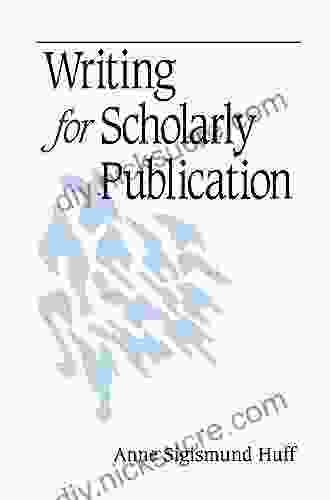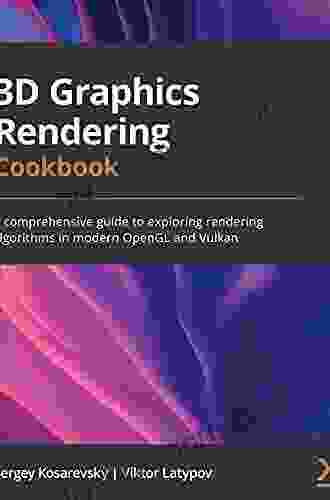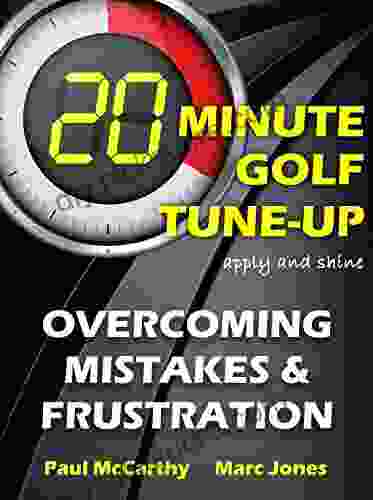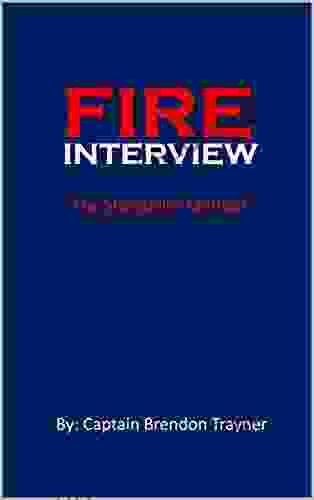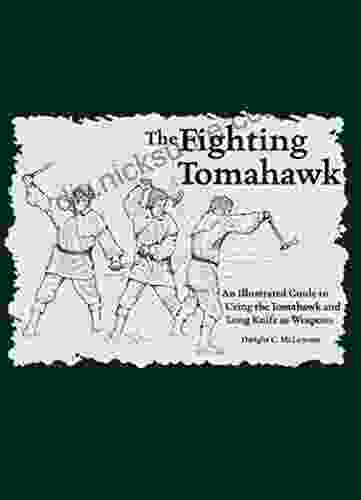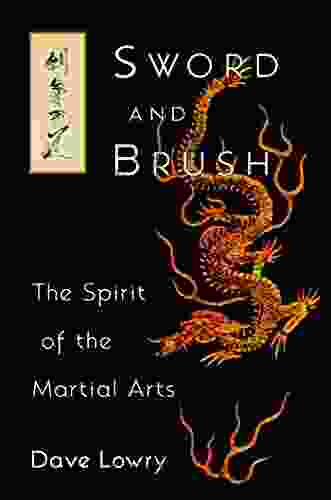Writing for Scholarly Publication: An In-Depth Guide Inspired by Anne Sigismund Huff

Embarking on the journey of writing for scholarly publication can be both an exciting and daunting endeavor. To navigate this complex landscape, it is imperative to equip oneself with the necessary knowledge and strategies. This article draws inspiration from the invaluable insights of Anne Sigismund Huff, a renowned expert in scholarly writing, to provide a comprehensive guide for aspiring authors.
Understanding the Purpose of Scholarly Publication
At its core, scholarly publication serves as a medium for disseminating original research findings, advancing knowledge within specific disciplines, and facilitating intellectual discourse. Through the rigorous process of peer review, scholarly journals ensure the credibility and quality of published works.
4.3 out of 5
| Language | : | English |
| File size | : | 5190 KB |
| Text-to-Speech | : | Enabled |
| Screen Reader | : | Supported |
| Enhanced typesetting | : | Enabled |
| Word Wise | : | Enabled |
| Print length | : | 195 pages |
Selecting the Right Journal
Identifying the appropriate journal for your research is crucial for successful publication. Consider the scope, audience, and impact factor of potential journals. Familiarize yourself with their submission guidelines, ensuring your paper aligns with their specific requirements.
Crafting a Compelling Research Question
The foundation of a successful scholarly paper lies in a well-defined research question. This question should be specific, focused, and original, addressing a gap in existing knowledge. Avoid overly broad or unanswerable questions.
Structuring Your Paper Effectively
Scholarly papers typically adhere to a standard structure: , Literature Review, Methods, Results, Discussion, and . Each section serves a specific purpose and should flow seamlessly to guide the reader through your research.
The sets the context for your research, stating your research question and providing background information. It should engage the reader and highlight the significance of your work.
Literature Review
The literature review critically examines existing research related to your topic. It demonstrates your familiarity with the field and establishes the theoretical framework for your study.
Methods
The methods section describes the design and procedures used in your research. It should be detailed and transparent, allowing readers to evaluate the validity and reliability of your findings.
Results
The results section presents your research findings in an organized and unbiased manner. Use tables, graphs, and other visuals to illustrate your data effectively.
Discussion
The discussion interprets your findings, discussing their implications and limitations. Compare your results with previous research, highlighting novel insights and contributions to the field.
The summarizes your main findings, reiterates the significance of your research, and suggests directions for future work. It should provide a clear and concise overview of your research.
Writing in the Scholarly Style
Scholarly writing adheres to specific conventions and style guidelines. Use precise language, avoid jargon, and maintain a neutral and objective tone. Cite your sources meticulously and follow the journal's designated referencing style.
Peer Review Process
Once you submit your paper, it undergoes a rigorous peer review process. Expert reviewers evaluate your work based on its originality, methodology, results, and overall contribution to the field. Be prepared to address their feedback and revise your paper accordingly.
Writing for scholarly publication is a challenging but rewarding endeavor that requires careful planning, meticulous research, and effective communication. By following the principles outlined in this guide, inspired by the wisdom of Anne Sigismund Huff, aspiring authors can navigate the scholarly publishing landscape with confidence and contribute to the advancement of knowledge in their respective fields.
About Anne Sigismund Huff
Anne Sigismund Huff is a celebrated author, editor, and professor specializing in academic writing and scholarly communication. Her expertise in guiding researchers through the complexities of scholarly publication has made her a sought-after mentor and resource for scholars worldwide.
4.3 out of 5
| Language | : | English |
| File size | : | 5190 KB |
| Text-to-Speech | : | Enabled |
| Screen Reader | : | Supported |
| Enhanced typesetting | : | Enabled |
| Word Wise | : | Enabled |
| Print length | : | 195 pages |
Do you want to contribute by writing guest posts on this blog?
Please contact us and send us a resume of previous articles that you have written.
 Fiction
Fiction Non Fiction
Non Fiction Romance
Romance Mystery
Mystery Thriller
Thriller SciFi
SciFi Fantasy
Fantasy Horror
Horror Biography
Biography Selfhelp
Selfhelp Business
Business History
History Classics
Classics Poetry
Poetry Childrens
Childrens Young Adult
Young Adult Educational
Educational Cooking
Cooking Travel
Travel Lifestyle
Lifestyle Spirituality
Spirituality Health
Health Fitness
Fitness Technology
Technology Science
Science Arts
Arts Crafts
Crafts DIY
DIY Gardening
Gardening Petcare
Petcare Tammara Webber
Tammara Webber Roxanne Martin
Roxanne Martin Alf Wilkinson
Alf Wilkinson Cassandra Clare
Cassandra Clare Gabrielle Coleman
Gabrielle Coleman Tripp Bowden
Tripp Bowden Dr Tricia Groff
Dr Tricia Groff Katerina Griffith
Katerina Griffith Judi Garman
Judi Garman Lucy Christopher
Lucy Christopher Dirk F Moore
Dirk F Moore Anne Sigismund Huff
Anne Sigismund Huff Akash Kapur
Akash Kapur Rens Bod
Rens Bod A J Messenger
A J Messenger Roy Richard Grinker
Roy Richard Grinker Iasha King
Iasha King Anghel Leonard
Anghel Leonard Susan Striker
Susan Striker Michael Shingleton
Michael Shingleton Marcus Butler
Marcus Butler Diane Burke Fessler
Diane Burke Fessler John Williams
John Williams Fernanda Pirie
Fernanda Pirie James Baldwin
James Baldwin Matthew J Friedman
Matthew J Friedman Val Emmich
Val Emmich Rysa Walker
Rysa Walker Oba Ilari Aladokun
Oba Ilari Aladokun Kelly Starrett
Kelly Starrett Bill Jones
Bill Jones Diane Stresing
Diane Stresing A G Cairns Smith
A G Cairns Smith Sam Warburton
Sam Warburton Shenyang Guo
Shenyang Guo Lilin Yang
Lilin Yang Sandra Niche
Sandra Niche Karla Helbert
Karla Helbert Dale Dougherty
Dale Dougherty A M Wilson
A M Wilson Bear Heart
Bear Heart Lyla Lee
Lyla Lee Loretta Sponsler
Loretta Sponsler Jennifer Trainer Thompson
Jennifer Trainer Thompson Alyssa Padgett
Alyssa Padgett Sharie King
Sharie King Rafe Esquith
Rafe Esquith William Monk
William Monk Todd Rose
Todd Rose Alexander Greenmaj
Alexander Greenmaj Bree Moore
Bree Moore Susan Cooper
Susan Cooper Max Tegmark
Max Tegmark Joe Navarro
Joe Navarro Noah Gift
Noah Gift Roger Zelazny
Roger Zelazny W Timothy Gallwey
W Timothy Gallwey Adrian Dater
Adrian Dater Peter Shelton
Peter Shelton Shanterra Mcbride
Shanterra Mcbride Rick Telander
Rick Telander Leigh Newman
Leigh Newman Mark Ryan
Mark Ryan Anna Goldsworthy
Anna Goldsworthy Todd Wanerman
Todd Wanerman Ed Webster
Ed Webster Tanya Selvaratnam
Tanya Selvaratnam A L Graziadei
A L Graziadei Mj Porter
Mj PorterA G
 Russell Sher
Russell Sher A J Mackinnon
A J Mackinnon Peter Maas
Peter Maas Zen Lylah
Zen Lylah Joshua Akin
Joshua Akin Crystal Cestari
Crystal Cestari Chelsea Crockett
Chelsea Crockett Monte Burke
Monte Burke Erin Watt
Erin Watt Kevin Adams
Kevin Adams Pintip Dunn
Pintip Dunn Aaron Kleinmeyer
Aaron Kleinmeyer Lauren Muhlheim
Lauren Muhlheim Dawn Huebner
Dawn Huebner Peter Zheutlin
Peter Zheutlin Sandra Swenson
Sandra Swenson Rebecca Black
Rebecca Black Dan Romanchik Kb6nu
Dan Romanchik Kb6nu A M Strickland
A M Strickland Kenneth Cline
Kenneth Cline Remy Agee
Remy Agee Polly Moore
Polly Moore Linda Tuhiwai Smith
Linda Tuhiwai Smith Kathlyn Gay
Kathlyn Gay Dr Alan Whitcomb
Dr Alan Whitcomb Ken Alder
Ken Alder Susan Aud Sonders
Susan Aud Sonders Sherine Hamdy
Sherine Hamdy Marc S Sabatine
Marc S Sabatine Jonathan Eig
Jonathan Eig Pete Ripmaster
Pete Ripmaster Leandro Taub
Leandro Taub Joe Pepitone
Joe Pepitone Brad K Chambers
Brad K Chambers Ilya Ru
Ilya Ru Filippo Coarelli
Filippo Coarelli Paul Mccarthy
Paul Mccarthy Karl Knopf
Karl Knopf Chris Diamond
Chris Diamond E S Wynn
E S Wynn Thomas Hager
Thomas Hager John D Currid
John D Currid Catherine Rodgers
Catherine Rodgers Ryan Gray
Ryan Gray Giordano Scalzo
Giordano Scalzo Soap2day Publication
Soap2day Publication Peter Goldenthal
Peter Goldenthal Sky Marsen
Sky Marsen Lyndall Clipstone
Lyndall Clipstone William Bauer
William Bauer Heather Anderson
Heather Anderson Helen E Johnson
Helen E Johnson A G Howard
A G Howard Saxton Pope
Saxton Pope Eric Blehm
Eric Blehm Michelle Maccarthy
Michelle Maccarthy Jennifer Senior
Jennifer Senior Tom Jordan
Tom Jordan Adam Savage
Adam Savage Zander Brumbaugh
Zander Brumbaugh Linh Phung
Linh Phung Emily Evans
Emily Evans Jennifer N Smith
Jennifer N Smith Valerio Varesi
Valerio Varesi Joel David Hamkins
Joel David Hamkins Lou Zambello
Lou Zambello Ken Dryden
Ken Dryden Hazel Holmes
Hazel Holmes Pardha S Pyla
Pardha S Pyla Natalie Pompilio
Natalie Pompilio Jeff Kane
Jeff Kane Kenneth Cloke
Kenneth Cloke Timothy J Gawne
Timothy J Gawne Peter Nichols
Peter Nichols Robert P Harris
Robert P Harris Angela Himsel
Angela Himsel Ken Castor
Ken Castor Helen Buckley
Helen Buckley Jamal Moustafaev
Jamal Moustafaev Matilda Ramsay
Matilda Ramsay Byron Pitts
Byron Pitts A J Hamler
A J Hamler Homeira Qaderi
Homeira Qaderi Matthieu Ricard
Matthieu Ricard Jose M Forero Bautista
Jose M Forero Bautista Megan Vickers
Megan Vickers Cristian Salcescu
Cristian Salcescu Michael Dell
Michael Dell Jennifer L Armentrout
Jennifer L Armentrout Niall Ferguson
Niall Ferguson Dean R Johnson
Dean R Johnson Jean Philippe Dionne
Jean Philippe Dionne Freya Hoffmeister
Freya Hoffmeister Arlin Smith
Arlin Smith John Mordechai Gottman
John Mordechai Gottman Catherine Stonehouse
Catherine Stonehouse Grady Hendrix
Grady Hendrix Lou Tabory
Lou Tabory Amanda Ostrander
Amanda Ostrander R A Mejia
R A Mejia Kenay Keira
Kenay Keira Eric Armstrong
Eric Armstrong Glenn Patron
Glenn Patron Boston T Party
Boston T Party Ray Ordorica
Ray Ordorica Din Daniels
Din Daniels Christopher Small
Christopher Small Harry Yoon
Harry Yoon Dale P Clemens
Dale P Clemens Jm Mason
Jm Mason Lindsey Lapointe
Lindsey Lapointe Frost Kay
Frost Kay Alison Cotter
Alison Cotter Steve Angers
Steve Angers Peter Godfrey Smith
Peter Godfrey Smith Cailin O Connor
Cailin O Connor Bob Frye
Bob Frye Eugene Don
Eugene Don William F Mann
William F Mann Corina Morariu
Corina Morariu Tsao Lin E Moy L Ac Msom
Tsao Lin E Moy L Ac Msom Jack Grimshaw
Jack Grimshaw Rachael Allen
Rachael Allen Armin A Brott
Armin A Brott Sean Skahan
Sean Skahan A Roger Ekirch
A Roger Ekirch Upton Sinclair
Upton Sinclair Andreas Quast
Andreas Quast Certsquad Professional Trainers
Certsquad Professional Trainers Abigail Burd Lcsw Pmh C
Abigail Burd Lcsw Pmh C N J Enfield
N J Enfield A F Stewart
A F Stewart Nick Jackson
Nick Jackson William Ramsey
William Ramsey Joseph Mctaggart
Joseph Mctaggart Walter Dean Myers
Walter Dean Myers Dame Darcy
Dame Darcy Gary Gruber
Gary Gruber David Remnick
David Remnick Philip Yarrow
Philip Yarrow Louis Jacques Dorais
Louis Jacques Dorais The R A
The R A Stan Tenen
Stan Tenen Rina Kent
Rina Kent David G Taylor
David G Taylor John L Parker Jr
John L Parker Jr Jordan B Peterson
Jordan B Peterson Chris I Naylor
Chris I Naylor Chuck Whelon
Chuck Whelon Susanne Foitzik
Susanne Foitzik Patrick Meechan
Patrick Meechan Hicham And Mohamed Ibnalkadi
Hicham And Mohamed Ibnalkadi Sarah Jo Brown
Sarah Jo Brown Dave Lowry
Dave Lowry Jennie Finch
Jennie Finch Steven Raichlen
Steven Raichlen John Halligan
John Halligan Okina Baba
Okina Baba Elisabeth Fassas
Elisabeth Fassas Ridge Magee
Ridge Magee Jennifer Longmore
Jennifer Longmore John Brenkus
John Brenkus Matt Brown
Matt Brown Charles Edward Chapel
Charles Edward Chapel Winston Starr
Winston Starr Mandy Rivers
Mandy Rivers Seth M Holmes
Seth M Holmes Dane Huckelbridge
Dane Huckelbridge Raymond J Carroll
Raymond J Carroll Timothy C Urdan
Timothy C Urdan Bob Plager
Bob Plager Sarah Sutton
Sarah Sutton Helen Fitzgerald
Helen Fitzgerald Laura Pohl
Laura Pohl Val Mcdermid
Val Mcdermid Meghan Leahy
Meghan Leahy Kerri Hummingbird Sami
Kerri Hummingbird Sami John L Messina
John L Messina Bob Trueman
Bob Trueman Bruce Tremper
Bruce Tremper Shelly Mazzanoble
Shelly Mazzanoble Gemma Milne
Gemma Milne A H Almaas
A H Almaas Charles Butler
Charles Butler Ray Bradbury
Ray Bradbury Vitaly Pedchenko
Vitaly Pedchenko Dan Limbaugh
Dan Limbaugh Lisa Pease
Lisa Pease Tim Flanagan
Tim Flanagan A R Vasishtha
A R Vasishtha Alex Karp
Alex Karp Francis Fukuyama
Francis Fukuyama Heather Gudenkauf
Heather Gudenkauf Scientia Media Group
Scientia Media Group Jonalu Johnstone
Jonalu Johnstone Thomas C Tabor
Thomas C Tabor Mia Kankimaki
Mia Kankimaki Calvin L Chou
Calvin L Chou Sergey Kosarevsky
Sergey Kosarevsky Mike Tidwell
Mike Tidwell Eileen Tracy
Eileen Tracy Tiara R Brown
Tiara R Brown Blair Holden
Blair Holden Scott A Ostrow
Scott A Ostrow Lauren Oliver
Lauren Oliver Andrew Henderson
Andrew Henderson A J Mackenzie
A J Mackenzie Raymond M Smullyan
Raymond M Smullyan Dmv Test Bank
Dmv Test Bank Mike Branon
Mike Branon Russell Davis
Russell Davis Michael D Coogan
Michael D Coogan Watt Key
Watt Key Michael Labossiere
Michael Labossiere Caspar Craven
Caspar Craven A K Davidson
A K Davidson Josh Skeen
Josh Skeen William Scott Wilson
William Scott Wilson Jane Austen
Jane Austen Leslie Stager
Leslie Stager Nicole Conway
Nicole Conway Barry Werth
Barry Werth Sonya Chappell
Sonya Chappell Jon Gillespie Brown
Jon Gillespie Brown Vernon Trafford
Vernon Trafford Jim Allen
Jim Allen Dr Stephanie Bloodworth Psyd
Dr Stephanie Bloodworth Psyd Todd Downs
Todd Downs Lilith Mclelland
Lilith Mclelland George Francis Dow
George Francis Dow Thomas Mcguane
Thomas Mcguane Paul Watzlawick
Paul Watzlawick Cathy A Malchiodi
Cathy A Malchiodi Michael Lanza
Michael Lanza King Solomon
King Solomon Andrea Falk
Andrea Falk William C Oakes
William C Oakes Anthony J Onwuegbuzie
Anthony J Onwuegbuzie Tony Wright
Tony Wright Christiane Kutik
Christiane Kutik Bryan Berg
Bryan Berg Manoush Zomorodi
Manoush Zomorodi Rosie Garthwaite
Rosie Garthwaite Marlynn Jayme Schotland
Marlynn Jayme Schotland Anne Deans
Anne Deans Jec Aristotle Ballou
Jec Aristotle Ballou Jamie Vardy
Jamie Vardy Barbara J Bain
Barbara J Bain Larit Levy
Larit Levy Lindsey Vonn
Lindsey Vonn Eric Sevareid
Eric Sevareid Mark Obmascik
Mark Obmascik Jonathan S Rose
Jonathan S Rose Carrie Harper
Carrie Harper Cath Smith
Cath Smith Olivia Smith
Olivia Smith John Long
John Long David Deutsch
David Deutsch Flo Perry
Flo Perry David J Vanbergen Jr
David J Vanbergen Jr Anji Andrews
Anji Andrews Nancy Mckenzie
Nancy Mckenzie Thomas R Martin
Thomas R Martin Sadie Robertson Huff
Sadie Robertson Huff Randy Friedman
Randy Friedman Dr Howard Rankin
Dr Howard Rankin Stephen R Lawhead
Stephen R Lawhead Kathy Koch
Kathy Koch Jan Morris
Jan Morris David A Wells
David A Wells Michael Lardon
Michael Lardon Yasu
Yasu Gordon Macquarrie
Gordon Macquarrie Businessnews Publishing
Businessnews Publishing Don Fink
Don Fink Francis Pryor
Francis Pryor Bruce Lansky
Bruce Lansky Mrjamvad
Mrjamvad David Spiegelhalter
David Spiegelhalter Ari Tuckman
Ari Tuckman Rebecca Pelky
Rebecca Pelky Lisa Murphy
Lisa Murphy Kenn Bivins
Kenn Bivins Helen Marot
Helen Marot Stan Skinner
Stan Skinner David Magee
David Magee Virginia Willis
Virginia Willis Georgia Varozza
Georgia Varozza Bruce Collier
Bruce Collier Garret Romaine
Garret Romaine Lillian Tibbles Phd
Lillian Tibbles Phd Day Leitao
Day Leitao Marks Prep
Marks Prep Todd Gitlin
Todd Gitlin Peter Rees
Peter Rees John Almberg
John Almberg Dr Kevin Leman
Dr Kevin Leman Micha Gorelick
Micha Gorelick Jim Vernes
Jim Vernes David H Barlow
David H Barlow William Minto
William Minto Zen Faulkes
Zen Faulkes Raymonde Carroll
Raymonde Carroll Philip Golding
Philip Golding Jonathan Mckee
Jonathan Mckee Harrison Fluss
Harrison Fluss Christine Wheeler
Christine Wheeler A J Carlisle
A J Carlisle Rekha Ramcharan
Rekha Ramcharan Len Fisher
Len Fisher Cyndi Kinney
Cyndi Kinney Cynthia Ulrich Tobias
Cynthia Ulrich Tobias K A Riley
K A Riley Charles Szypszak
Charles Szypszak Katrina Abbott
Katrina Abbott A J Stewart
A J Stewart Rebecca A Moyes
Rebecca A Moyes Taha Sochi
Taha Sochi A L Knorr
A L Knorr Sherrilyn Kenyon
Sherrilyn Kenyon Toni Natalie
Toni Natalie A J Angulo
A J Angulo Eva Mauer
Eva Mauer Daniel S Pierce
Daniel S Pierce Steve Hindman
Steve Hindman Richard Heath
Richard Heath Brian Clegg
Brian Clegg Shauna Lynn Panczyszyn
Shauna Lynn Panczyszyn Amos Yong
Amos Yong Mitch Landrieu
Mitch Landrieu
Light bulbAdvertise smarter! Our strategic ad space ensures maximum exposure. Reserve your spot today!

 Samuel BeckettDear Evan Hansen The Novel: A Captivating Exploration of Identity, Loss, and...
Samuel BeckettDear Evan Hansen The Novel: A Captivating Exploration of Identity, Loss, and... Terence NelsonFollow ·15.1k
Terence NelsonFollow ·15.1k Mario SimmonsFollow ·7.9k
Mario SimmonsFollow ·7.9k Benji PowellFollow ·10k
Benji PowellFollow ·10k George HayesFollow ·7.8k
George HayesFollow ·7.8k Bryson HayesFollow ·7.2k
Bryson HayesFollow ·7.2k Bradley DixonFollow ·18.8k
Bradley DixonFollow ·18.8k Hugh ReedFollow ·8.8k
Hugh ReedFollow ·8.8k Tim ReedFollow ·4.1k
Tim ReedFollow ·4.1k
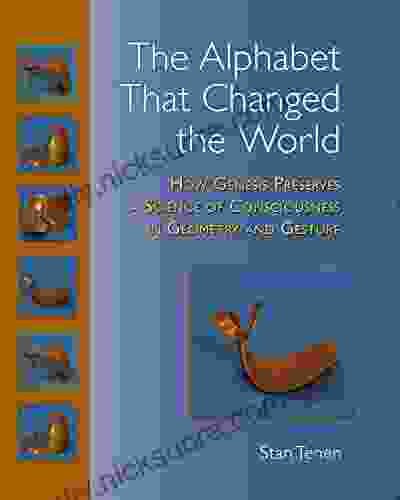
 Franklin Bell
Franklin BellHow Genesis Preserves Science Of Consciousness In...
The book of Genesis is...
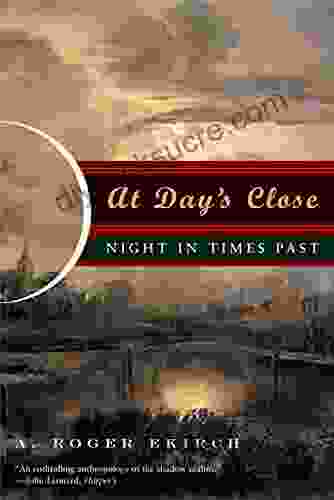
 Ted Simmons
Ted SimmonsAt Day's Close, Night in Times Past
As the sun dips...
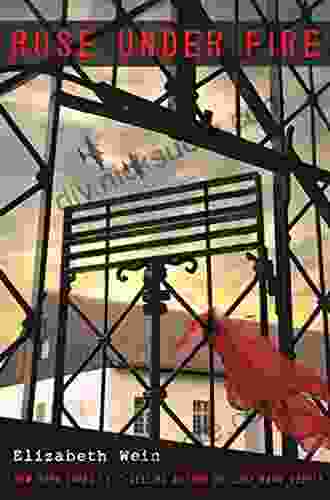
 Kenneth Parker
Kenneth ParkerRose Under Fire: Code Name Verity - A Heartbreaking and...
In the annals of...

 Jerry Hayes
Jerry HayesNurturing Massage for Pregnancy: A Comprehensive Guide to...
Pregnancy is...

 Blake Bell
Blake BellFill in the Blank: Word Kind of Animal Farm for Kids and...
This interactive fill-in-the-blank...
4.3 out of 5
| Language | : | English |
| File size | : | 5190 KB |
| Text-to-Speech | : | Enabled |
| Screen Reader | : | Supported |
| Enhanced typesetting | : | Enabled |
| Word Wise | : | Enabled |
| Print length | : | 195 pages |


